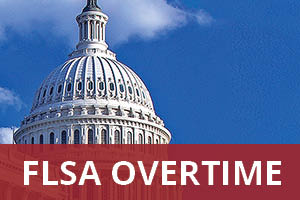by CUPA-HR | July 1, 2024
Update: On November 8, the federal judge from the Eastern District of Texas is set to hold a hearing on summary judgement in the business community’s challenge to DOL’s overtime final rule. While it is unknown how soon after we could get a decision on the validity of the rule, the judge could rule from the bench or quickly after the hearing. CUPA-HR will send out updates on the rulings as soon as we know.
On June 28, a federal judge in the Eastern District of Texas Court granted a narrowly scoped preliminary injunction for the overtime rule in the state of Texas, blocking the Department of Labor’s overtime final rule from taking effect on July 1, 2024. The judge only blocked enforcement for employees of the state of Texas (i.e., public institutions), so private institutions in Texas and all other institutions outside of Texas will still need to comply with the overtime rule beginning July 1, 2024.
The motion for a preliminary injunction was filed by the state of Texas alongside a lawsuit challenging the validity of the final rule in its entirety. At least two other lawsuits are currently pending before the Eastern District Court of Texas. The preliminary injunction will block the final rule from taking effect on July 1 for public employers and employees in Texas until a later decision is issued on the lawsuits challenging the validity of the final rule.
As a reminder, the final rule implemented a two-phase approach to increasing the minimum salary threshold under the Fair Labor Standards Act overtime regulations. The first increase was expected to take effect on July 1, increasing the minimum salary threshold from the current level of $684 per week ($35,568 per year) to $844 per week ($43,888 per year). The second increase is set to take effect on January 1, 2025, and it would increase the minimum salary threshold again to $1,128 per week ($58,656 per year). The final rule also adopted automatic updates to the minimum salary threshold that would occur every three years.
Given the judge’s narrow decision granting the preliminary injunction, private institutions in Texas and all institutions outside of Texas are still required to implement adjustments to comply with the July 1 minimum salary threshold until a later decision is made on the validity of the rule as a whole. CUPA-HR will be monitoring the pending cases closely.
House Appropriations Subcommittee Bill
On June 26, the House Appropriations Subcommittee on Labor, Health and Human Services, and Education released their fiscal year 2025 funding legislation for the Department of Labor (DOL) and other related agencies, which included a provision to prohibit any funding provided to DOL under the bill from administering, implementing or enforcing the overtime final rule. The Subcommittee passed the legislation out of Committee during a markup on June 27. It will now be sent to the floor for a vote, where House Republicans have a slim majority and could pass the bill along partisan lines. The fate of the overtime provision appears uncertain in the Senate, however, as the Democrat-controlled chamber is unlikely to include such language in their appropriations bill. CUPA-HR will continue to keep members apprised of any updates on the status of the overtime final rule.

